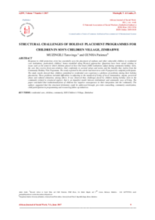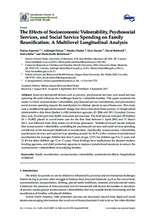Displaying 2321 - 2330 of 4400
World Challenge, the world's largest school-based volunteer travel company, will no longer offer orphanage volunteer placements overseas - effective by the end of this month.
This study observed the challenges experienced by children living in SOS Children's Village Bindura, Zimbabwe during a Community Holiday Visit Programme.
A mass grave, where hundreds of former child residents of a child care institution are believed to be buried, has been uncovered in Lanarkshire, southern Scotland.
This paper examines the extent to which socioeconomic vulnerability, psychosocial service consultations, and preventative social services spending impacts the reunification for children placed in out-of-home care.
In this radio interview, Leigh Mathews of ReThink Orphanages discusses why orphanage volunteering is harmful to the development of children and provides tips for those seeking international volunteering opportunities.
Rwanda's National Commission for Children (NCC) is implementing the Integrated Child Rights Policy (ICRP), which will continue support for more coordinated and comprehensive services for children, including the national Child Care Reform program and addressing issues pertaining to children living and working on the street.
This article utilizes data from the Bucharest Early Intervention Project to examine the neural indices of cognitive control and visual attention biases in children who have been institutionalized in order to understand how they influence the emergence of psychopathology in children with experience in institutional care.
Australia's education sector has agreed on the need for more regulation of the voluntourism industry to prevent students from engaging in programs exploitive to children overseas.
Overseas volunteering in orphanages has become a trend for tourists from Australia and other Western countries; this trend has fueled the recruitment and trafficking of poor children to fill orphanages as a means to profit off the donations of tourists.
In this month's "How to Give" column, Lansie Sylvia gives a variety of tips for those seeking to travel ethically.


